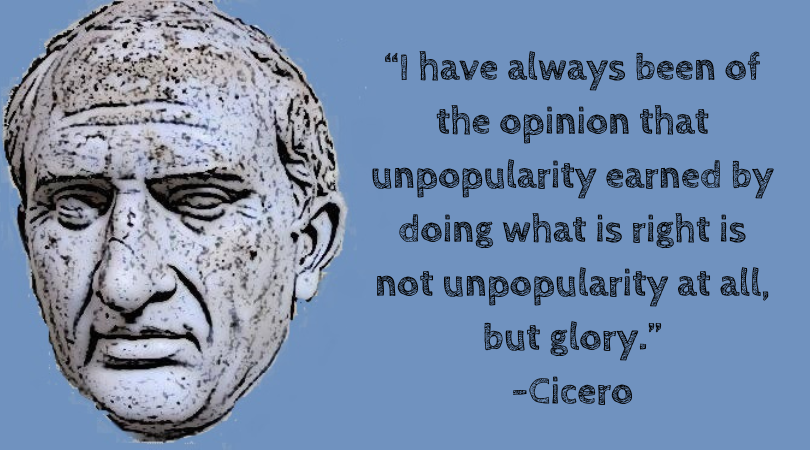Cicero has garnered renewed attention in recent years. He was a Roman Senator whose writings, as Historian Edward Gibbon put it, “breathed the spirit of freedom.” Particularly influential was his idea of natural law, followed by John Locke and other enlightenment thinkers: Human nature included reason, which could discover justice, which was the basis of law. Voltaire said “He taught us how to think.”
This month's post will focus on 3 of Cicero's opinions that may be unpopular, but are likely quite correct. Read on to find out what they are:
“I Have Always Been of the Opinion That Unpopularity Earned by Doing What is Right is Not Unpopularity at All, but Glory.”
Cicero's life was marked by a tension between the life of a politician and that of a philosopher. We can see how such tension is born out in the above quote. For Cicero, an activity is virtuous when it contributes to overall human virtue.[1] So it doesn't matter if an action makes you unpopular; if it is the right thing to do in service of virtue, that's what really matters. Cicero seems to have taken this maxim seriously since some of his political actions in support of the Republic contributed to his assassination.
We can apply this maxim in our lives too, even when the stakes aren't quite so high. Don't look to do only what is the easiest for you, focus on doing what is right, even if it takes longer and creates more hassle for you personally. Don't worry about other people's opinion if you know you are making the right choice. You can't control what others think.
"The Higher Our Position, the More Modestly We Should Behave."
Maybe this isn't an unpopular position in the sense that some people wouldn't agree, it's just that most of the elites and celebrities that we see today don't act this way. Immodesty, consumerism, greed, rudeness, and lust for power are commonplace among elites. Those who are humble are outliers.
And even more disconcerting is the general lack of understanding that those with political power, who are willing to wield it at whim without humility or modesty, are truly to be feared. The fact that many people still trust government officials who do this, shows a serious lack of understanding of both human nature (the corrupting influence of power) and sociological law (the Iron Law of Oligarchy).
"An Unjust Peace is Better Than a Just War."
Cicero was not a pacifist, however he understood peace to be the natural and desirable condition. In Cicero on Peace and War, G. A. Harbee writes:
"It is often stated that among the Greeks and Romans war, or at any rate a latent hostility, was recognized as the normal condition in the realtion of one state to another. The statement is probably not true of the Romans, and certainly not true of Cicero. It is impossible to understand his expressed views on peace and war except on the basis of his belief in peace as the normal international relationship."
Cicero goes on lays out 2 parameters for a just war:
"Now since there are two ways of contesting for a decision, one by discussion, the other by force, and since the former is proper for man, the latter for beasts, one should have recourse to the latter only if it is impossible to use the former. Wars then are indeed to be waged for this reason, that without wrong life may be lived in peace [ut sine iniuria in pace vivatur]." In the De Republica he states, "Those wars are unjust which are undertaken without cause. Now without a purpose to punish wrong [ulciscendi] or to beat back an attacking enemy, no just war can be waged."
Cicero thought that war is like the actions of wild beasts. War is the worst thing people do to each other. That is why we should be very reticent to enter into it. The philosopher Bertrand Russell shared this sentiment when he famously said some millennia later that, "War doesn't determine who is right, only who is left." For these reasons, extreme caution towards war seems to be to be the correct position, even if unpopular.
~
Sources:
- Cicero’s Skepticism and His Recovery of Political Philosophy. (n.d.). Retrieved July 30, 2017, from https://books.google.com/
- De Officiis 91-8.
- (Letters to Atticus and Cicero on Peace and War hyperlinked above.)
Read Next:
War Is A Racket: A Few Profit, the Many Pay
Read These 5 Books for a Deeper Understanding of Politics
5 Things that You Need to be Happy According to Cicero
Pin This:










